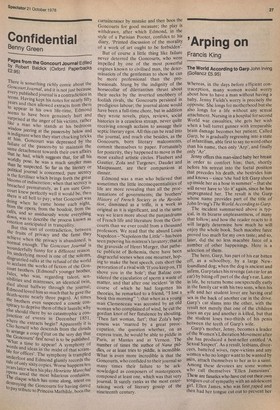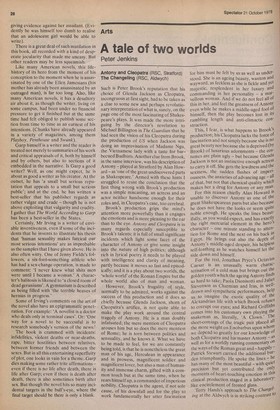'Arping on
Francis King
The World According to Garp John Irving (Gollancz £5.95) Whereas, in the days before efficient contraception, many women would worry about how to have a man without having a baby, Jenny Fields's worry is precisely the opposite. She longs for motherhood but she also longs for a life without any sexual attachment. Nursing in a hospital for second World war casualties, she gets her wish when a ball turret gunner with irreparable brain damage becomes her patient. Called Carp, he is gradually regressing into a state of infantilism, able first to say no word other than his name, then only `Arp', and finally only 'Ar'.
Jenny offers this man-sized baby her breast in order to comfort him; then, shortly before his retreat into the foetal position that precedes his death, she bestrides him and knows — since 'she had felt Garp shoot up inside her as a hose in summer' — that she will never have to 'do it' again, since he has impregnated her. The result is the Garp whose name provides part of the title of John Irving's The World According to Garp.
The incident summarised above is typical, in its bizarre unpleasantness, of many that follow; and how the reader reacts to it will largely determine how much he will enjoy the whole book. Such macabre farce proved too much for my own taste; and so, later, did the no less macabre farce of a number of other happenings. Here is a selection of them.
The hero, Garp, has part of his ear bitten off, as a schoolboy, by a large Newfoundland dog; when the dog is ancient and infirm, Garp takes his revenge (an ear for an ear) by biting off part of the dog's ear. Later in life, he returns home unexpectedly early in the family car with his two sons, when his wife and her student lover are having oral sex in the back of another car in the drive. Carp's car slams into the other, with the result not merely that one of the children loses an eye and another is killed, but that the student loses two-thirds of his penis between the teeth of Carp's wife.
Garp's mother, Jenny, becomes a leader of the Women's Liberation Movement after she has produced a best-seller entitled 'A Sexual Suspect'. As a result, lesbians, divorcees, banded wives, rape-victims and any women who no longer want to be wanted by men, attach themselves to her as to a saint. Among these devotees arc some women who call themselves 'Ellen Jamesians'. These are fanatics who have cut out their own tongues out of sympathy with an adolescent girl, Ellen James, who was first raped and then had her tongue cut out to prevent her giving evidence against her assailant. (Evidently he was himself too dumb to realise that an adolescent girl would be able to write).
There is a great deal of such mutilation in this book, all recorded with a kind of desperate jocularity that made me uneasy. But other readers may be less squeamish.
Like many American novels, this lifehistory of its hero from the moment of his conception to the moment when he is assassinated by one of the Ellen Jamesians (his mother has already been assassinated by an outraged man), is far too long. Also, like many American novels, it has a desultory air about it, as though the writer, living on some campus, had been under no financial pressure to get it finished but at the same time had felt obliged to publish some section from time to time as an earnest of his intentions. (Chunks have already appeared in a variety of magazines, among them Playboy, Penthouse and Swank).
Garp himself is a writer and the reader is treated not merely to summaries of his work and critical appraisals of it, both by himself and by others, but also to sections of it embedded in the narrative. Is Garp a good writer? Well, as one might expect, he is about as good a writer as his creator. At the outset, he has 'a small but serious reputation that appeals to a small but serious public'; and at the end, he has written a best-seller that his publisher regards as rather vulgar and crude — though he is not above exploiting that vulgarity and crudity. I gather that The World According to Garp has been a best-seller in the States.
Certainly, Mr Irving is a writer of enviable inventiveness, even if some of the incidents that he invents to illustrate his thesis that `human sexuality makes farcical our most serious intentions' are as improbable as the samples that I have given above. He is also often witty. One of Jenny Fields's followers, a six-foot-something athlete who has had a sex-change operation, is made to comment: `I never knew what shits men were until I became a woman.' A character's halitosis is likened to 'a closed room of dead geraniums'. A gymnasium is described as being filled with 'the terrible heaves of hernias in progress.'
Some of Irving's comments on the art of the novel also have an epigrammatic penetration. For example: 'A novelist is a doctor who deals only in terminal cases'. Or: 'One way for a novel to be successful is to research somebody's version of the news.' The book is crammed with incidents: infidelities, violent deaths or near-deaths, rape, bitter hostilities between relatives, between former friends and between the sexes. But in all this entertaining superfluity of plot, one looks in vain for a theme. Garp dies making some rather trite affirmations — even if there is no life after death, there is life after Garp; even if there is death after death, there is also sometimes birth after sex. But though the novel hits so many incidental targets in the bull's-eye, where the final target should be there is only a blank.







































 Previous page
Previous page